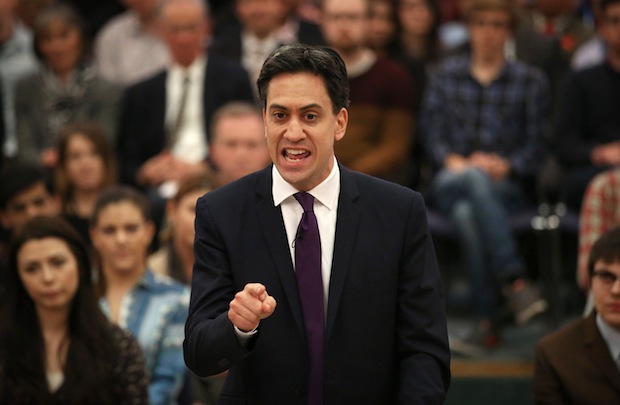Ed Miliband’s make-or-break speech this morning was fine. That’s fine as in it did the job just fine, rather than that it was a fine speech that his party will reminisce about for many years. The main challenge was for him to not mess up, either by failing to mention the deficit, tripping up on the way to the lectern, or appearing unconvincing. He did mention the deficit, he did deliver the speech from a lectern (albeit in the round, which is a favoured format of his because it looks informal, but that’s not really what he needs at the moment when he’s trying to look formal and prime ministerial), and he did sound passionate.
Miliband talked about his values and his motivation for doing the job. The audience, which seemed to consist of well-selected and impressively tribal Labour members, loved his line that he was ‘willing to put up with whatever is thrown at me, in order to fight for you’.
He also managed to avoid spending the whole speech harping on about himself, and instead moved the conversation on to the Labour party’s policies. This tells us that he has accepted that he is not his party’s greatest asset and that he and his colleagues need to do everything they can to sell the party’s policies to the electorate. The policy section was particularly good, with the Labour leader listing all the plans that his party had for governing. There is a feeling in the Shadow Cabinet, rightly or wrongly, that it’s got a good amount of policy work done anyway and that they now need to find a way of selling what they’ve come up with.
There was one particularly striking section in which he turned on Ukip in a way he hasn’t before. He took a similar line to Chuka Umunna in attacking Nigel Farage’s party, rather than subtly pandering to it, saying:
‘I think it is time we levelled with people about UKIP. They’ve got away with it for too long. It is time we had a debate about where they really stand. They do have a vision of the past. But I say to working people in this country, let’s really examine their vision. Because when you stop and look at it, it is not really very attractive.’
Afterwards, he was surprisingly calm and generous in the way he answered questions to journalists (though the tribal audience seemed rather shocked and offended that the hacks weren’t asking nice questions). When asked what he could do about the fact that voters were telling MPs on the doorstep that they liked Labour but couldn’t vote for Miliband, he said:
‘What I believe is that if we go our and fight for what we believe in, we’re going to win the election. I’ve got an old fashioned view about this which is that you don’t declare the result of the match until the final whistle. That’s the way the game works. We’ve got a general election, we’ve got six months in which we’re going to have the argument about what kind of country we want. You know, I relish the opportunity to go out and argue what I stand for, what kind priorities do people want. Do people want decency? Do people want someone who will stand up to powerful forces like banks and energy companies, do people want someone who has got big ideas to change this country? That’s what I offer.’
That’s not a bad way of dealing with a question to which the real answer is ‘not a lot’.
This speech didn’t really tell us anything new about Ed Miliband. It didn’t involve a personality transplant, funnily enough. But it did show that Ed wasn’t crushed and that he has reconciled himself to the fact that it’s not really going to be him who wins the election for Labour.
The two things that he thinks will win are the party’s policies on things like zero hours contracts and the NHS and an abiding sense among voters in key marginal seats that life isn’t getting better for them, hence his ‘zero-zero’ economy theme. That was unfortunately a weaker part of his speech as ‘zero-zero’ sounds like a drink or a reference to the amount of support he has, but Ed has clearly worked out that even if other voters want optimism, the specific group whose votes will swing the election in his favour still feel very pessimistic. But Labour at least has a reason not to sink further into the pit of misery. The facts about Ed may not have changed, but at least he didn’t break his make-or-break speech.







Comments